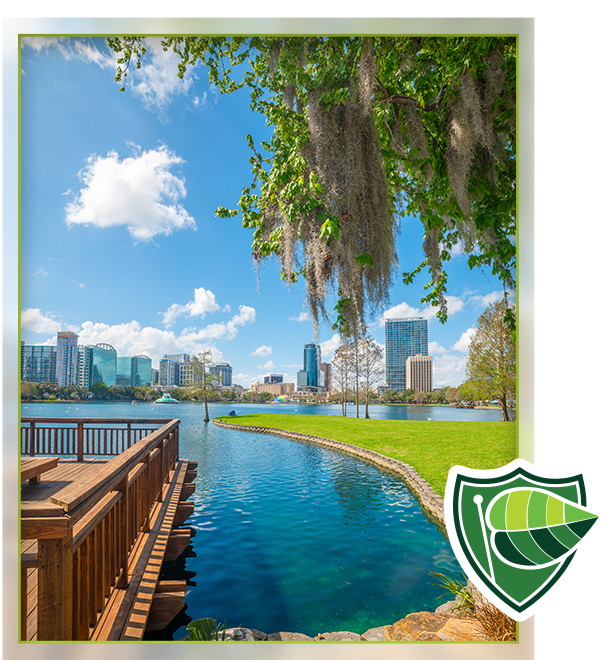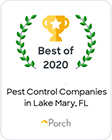
Why Does My Orlando Yard Have A Tick Problem
Ticks are plentiful in Orlando. The tropical climate of Florida makes it perfect for tick species to live and thrive. The weather here is also perfect for mice, rats, and other animals that pick ticks up and move them around. This is why Orlando residents have such a problem with ticks. Here are a few more reasons ticks are a problem.
Ticks Can Transmit Diseases
While there are several tick species in Florida, there are three that are of the greatest concern in Orlando. They are the blacklegged, American dog, and Lone Star tick. Blacklegged ticks are linked to the spread of Lyme diseases, which can lead to lifelong medical complications and ongoing misery. The American dog tick has a preference for domestic canines, but will bite humans. When it does, there is a potential for the transmission of Rocky Mountain spotted fever and other harmful diseases.


Why Choose Green Flag Services?
-
Locally Owned & OperatedWe are part of your community and take pride in caring for the residents and businesses of Central Florida.
-
126+ Years of Combined Industry Experience
Our seasoned professionals bring unparalleled expertise to every pest control solution.
-
Customer First MindsetWe stand behind our work. If you're unsatisfied for any reason or have an issue with pests again, give us a call and we'll make it right!
-
Fully Trained & Certified TeamWe are members of the National Pest Management Association and Florida Pest Management Association with over 55 years of industry experience.
-
Pest Control SolutionsThe green in "Green Flag" is to assure our customers that we only use environmentally-safe products for the safety of your family and pets.
-
Satisfaction GuaranteedYour satisfaction matters to us, which is why we offer a money-back and a reservice guarantee.
How To Address The Problem Of Ticks In Orlando
There are a few ways you can protect yourself from ticks. Obviously, the first step is to protect your pets, yourself, and everyone in your home by using personal prevention tips, such as purchasing flea collars, wearing mosquito repellent on your legs when you're outside, and doing routine checks for ticks. Early detection and removal of ticks can prevent the spread of diseases-causing bacteria.
Once you've done what you can to apply personal tick prevention, it is time to consider tick prevention in your yard. Everything you do to discourage animals from exploring your yard and coming near to the perimeter of your home will reduce the population of ticks in your yard. Consider removing food sources, water sources, and harborage options to deter animals.
Moisture plays a big role in the development of ticks. They require moist habitats to survive. If you take steps to reduce damp areas around your home, you can have an impact on tick viability.
The greater protection for your yard is only achievable through the application of tick control products. These should be selected and administered by a licensed pest management professional. If you'd like assistance with these, reach out to Green Flag Services. We support Orlando residents by offering industry-leading pest control services. You don't have to live with ticks in your yard.



Hear From Our Happy Customers
At Green Flag Services, your satisfaction is our priority! See for yourself what our customers have to say about working with us.
-
"Geffry is wonderful"He explains every part of the process in detail and will answer any questions. He understands about having fur babies and overall seems like a great guy. He’s always on time and very professional. We will absolutely use the company for the foreseeabl- Heather C.
-
"The Best!"Geffry is a great asset to your company. He is professional and knowledgeable. He gave great service to my mom's house. We all truly appreciate him coming and taking care of our problem.- Wendy W.
-
"Highly Recommend"Joshua not only has great customer service but with my continued service my pest are basically gone. If you are looking to get rid of your Pest at a reasonable price that really works I recommend Green Flag Services.- Jessica S.
-
"Couldn’t Be Happier"I've had Green Flag now for nine months. I've dealt with four people, one in the office and three technicians. Every one of them has been great! I couldn't recommend a better company to use.- Scott Z.
-
"Wonderful People"My call was promptly returned and service was scheduled. Good communication with service professional who arrived as scheduled. Very polite, professional service. Let’s see if any bugs feel the same way!- Stephanie P.
-
"Very happy with this company"Caleb is the tech and he is friendly and explains things and roaches have gone somewhere else to live which is fine with me!- Robyn S.
-
"I’m glad I called"Showed up on time. Took time to ask what specific issues I needed taken care of and found a few more that needed attention. Also treated outside, ant hills and 2 wasps nests.- Cecil S.
-
"AAA+++"Green Flag is the best company and has the best employees for pest control Not one bug since they started and we live in woods! I've recommended them many times and will continue to do so. The technicians are great people and we love seeing them! the mater- Donna S.












